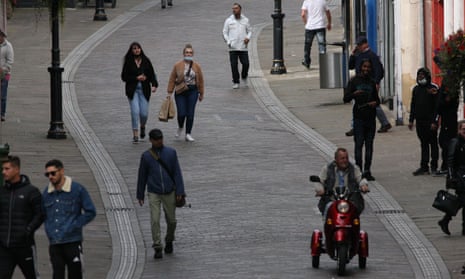Official figures have laid bare the huge financial divide in the UK caused by the coronavirus crisis, with one in three households experiencing income cuts, and young adults and black, Asian and minority ethnic people worst hit.
In a grim overview of the nation’s personal finances, the Financial Conduct Authority said 12 million adults were struggling to pay their bills, up by 2 million since coronavirus struck in February.
The financial regulator also found that 31% of UK households had experienced a decrease in income, with affected families typically having lost a quarter of their income.
Households from black and minority ethnic (BAME) backgrounds have suffered worst financially from the pandemic. The FCA found that 37% of BAME adults had taken an income hit, and were the most likely to have been forced into reduced working hours.
Young adults aged 25 to 34 – many of whom work in bars, restaurants and the arts and entertainment industry – have been the most likely to have had a change in employment as a result of the pandemic.
The FCA found that one in five young adults were now more likely to be seeking debt advice, compared with just one in 50 in the 55-64 age group.
As fresh coronavirus restrictions spread across the UK, Citizens Advice said millions of people were in a financially calamitous position. It called for improved government support and a continuation of the £20 a week uplift in universal credit beyond spring.
The chief executive of Citizens Advice, Dame Gillian Guy, said: “With the finances of 12 million people now fragile, there’s a real possibility that new lockdown restrictions will force many people into debt this winter. It’s in the government’s power to prevent this happening. By strengthening the support for those struggling with essential bills.”
The FCA said it had put in place a package of support to ensure banks helped struggling borrowers after 31 October, the cutoff date for the final applications under the coronavirus mortgage holiday scheme.
UK Finance, which represents Britain’s banks, said 4.4m payment deferrals of some sort – including personal loans, credit cards and mortgages – had been granted since the pandemic began, but only 323,700 were still in place.
Lenders had provided a total of 2.5m mortgage payment holidays, with 162,000 home buyers still on a payment deferral on 9 October, said UK Finance.
The banks said households struggling to meet their mortgage payments could choose from one of four options: extending the length of the mortgage term, switching to interest-only from repayment, deferring payment of the interest, or capitalising the interest and adding it to the total balance outstanding.
The energy regulator, Ofgem, has told utility companies to offer struggling customers “realistic” debt repayment plans, or emergency credit if they are on prepay energy meters.
The Consumer Council for Water separately warned that the financial help offered to 900,000 households risked running dry without a long-term solution to managing water debts.
But while the pandemic has badly damaged the finances of many households, others are more robust than before the virus struck.
The UK savings ratio – the proportion of total income that is put into savings – has leapt from 6% before the pandemic to 29%, with many of those who have remained employed now flush with cash as a result of spending less on holidays and going out.
Some of that money has been poured into the property market. Figures from HM Land Registry on Tuesday revealed that house prices rose 2.5% in the year to August, with the typical property changing hands at £6,000 more than a year before.
Transaction activity has also soared, with HMRC figures showing a 20% increase in September from the month before.
The financial analyst Laith Khalaf, at the investment group AJ Bell, said: “We are now at least a two-tier nation when it comes to finances. The pandemic has served to widen the wedge between the have and have nots in the UK.
“While 2 million more people may now struggle with bills and repayments as a result of the pandemic, only a few weeks ago mortgage approvals hit a 13-year high, according to the Bank of England.
“Those who have kept their jobs and income will likely have a new cash buffer in their bank account as lockdown [in effect] imposed a spending freeze.”
